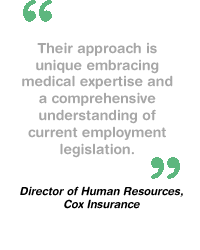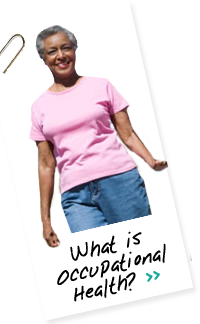
What is occupational health? An employee's perspective
Occupational health is a speciality that considers very specifically the effects of work on health. It also considers an individual's health, ability and fitness to perform a particular job. Its purpose is to protect each employee to ensure that the proposed work does not in any way damage or compromise their health.
Why am I being referred?
In line with Health & Safety obligations it is the duty of every employer to consider any health issues that might affect an employee's ability to safely fulfil their job. This is to ensure that consideration can be given to any adjustments or adaptations that might be required in respect of working activities, hours, shifts, absence, etc. The company is required by law (Health & Safety legislation and the Equality Act) to consider this information as a duty of care to its employees.
An occupational health assessment can be undertaken in one or a combination of ways (it is for the occupational health provider to decide). It can involve a consultation or a telephone assessment with an occupational health professional, a functional assessment with a physiotherapist and/or gaining a medical report and information from your GP or specialist.
Read more on:
- Confidentiality - click here
- The Equality Act - click here
- Starting a New Job - click here
- Absence/Ill Health Referrals - click here
- Health Surveillance - click here
Confidentiality
To ensure confidentiality is maintained, occupational health specialists, like us, are appointed by your employer. All doctors and nurses are medically qualified and specialise in occupational health and associated specialities to ensure you are assessed and advised appropriately. You may be asked to give your consent to allow us to approach your GP or Specialist for medical information, or be asked to speak to an occupational health doctor or nurse. The information that is gathered remains confidential and only information that is relevant to your job and/or attendance at work will be shared with your employer. Whenever possible we try not to include medical detail only to make recommendations from a medical perspective. If, for any reason, you wish to withhold your consent for us to offer advice, your employer may be forced to make decisions without the information we offer to provide. If you do have any concerns, or have any questions regarding the process, we would strongly urge that you discuss these with HR or your Manager.
Please click here to review our updated Privacy Policy.
What is the Equality Act?
The Equality Act ensures that people with health issues and disabilities are treated fairly in the workplace. It obliges employers to consider reasonable adjustments when recruiting and when considering work arrangements, hours and the working environment etc. in order to accommodate disabilities. The Act defines a disabled person as someone who has an impairment that has a substantially adverse (and long-term) effect on their ability to carry out normal day-to-day activities.
Starting A New Job
You may be referred to us when you apply for a job. It is the role of the occupational health specialist to advise the employer on aspects of an individual's health that might be made worse by any particular activity, and also on your fitness to perform a particular role. Sometimes this may be specifically defined by legislation. For example the DVLA provides definitive guidelines on medical circumstances that controls who can and cannot be considered fit to drive a bus, tram or heavy lorry. In other circumstances, occupational health professionals will make an assessment and advise the employer, ensuring that your health is protected and that the company is fulfilling its duty of care by offering a particular job. We may also make recommendations on adjustments in the workplace, or suggest possible alternatives to the job, that the company may wish to consider.
Absence / Ill Health Referrals
You may be referred for an occupational health assessment if you have been absent from work or have a health problem that prevents you from carrying out all or parts of your job. Your employer may need to better understand how long you might be away so that they can ensure your work is covered and can make alternative arrangements in your absence. They may also need to better understand if any adjustments need to be put in place on your return with regard to working hours, activities, etc. On occasions, the view may be that you will not achieve a return to work – this too is something that may need to be considered by the company.
Health Surveillance
As part of your job you may work in a noisy or dusty environment, or you may work with hand-held vibrating tools. If you do, it is the employer's job to ensure your health is not damaged by your working environment or the job you do. Recommendations may also be made to ensure that appropriate personal protective equipment, for example hearing protection or a face mask, is available. It means you may be seen periodically for tests to ensure that you remain well and that no aspect of your work is causing you any ill health. Health surveillance ensures that early signs of ill-health can be detected and dealt with promptly before becoming a long-term problem.




